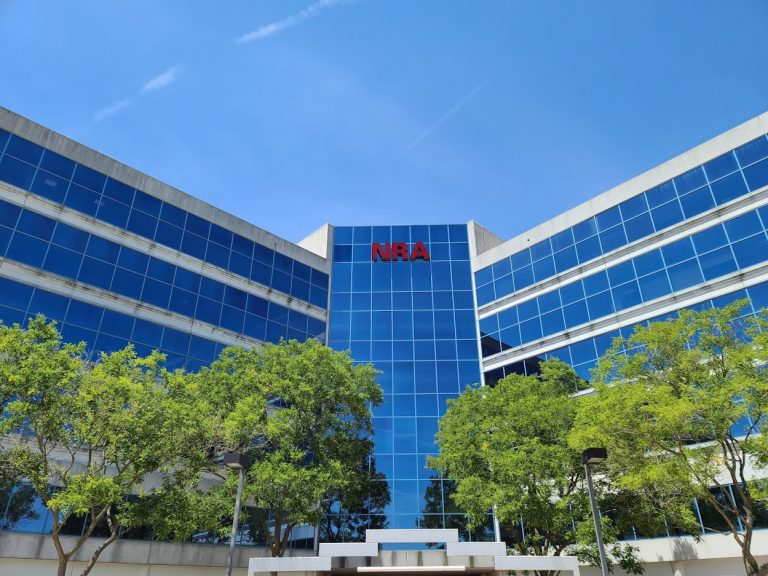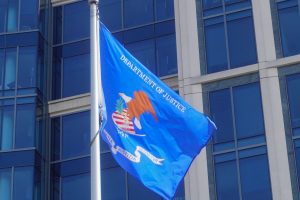The Department of Justice (DOJ) thinks a New York official violated the First Amendment rights of the National Rifle Association (NRA).
DOJ filed a brief that didn’t side with either party in the upcoming Supreme Court case but ultimately settled on the idea the official infringed the NRA’s free speech rights. The Department argued Maria Vullo, the former Superintendent of the New York State Department of Financial Services, made threats toward the NRA’s former insurance partners that constituted coercion. It encouraged the Court to find that Vullo’s conduct was unconstitutional.
“The allegations in petitioner’s operative complaint, taken as true, state a plausible claim that respondent violated the First Amendment by coercing regulated entities to terminate their business relationships with petitioner in an effort to suppress petitioner’s advocacy,” Solicitor General Elizabeth Prelogar wrote in an NRA v. Vullo amicus brief.
The DOJ brief puts the Biden Administration in the unusual position of defending one of its top political opponents. President Joe Biden has spent decades railing against the NRA as he pursues further gun restrictions, especially during his first term in office. But his DOJ now argues New York officials crossed the line when attempting to push private companies away from doing business with the group.
While many gun-rights groups and Republican lawmakers have also backed the NRA with their own filings, the case had already led to some strange bedfellows before the DOJ’s brief. The American Civil Liberties Union (ACLU) filed its own brief when the gun group first brought its case. Then the ACLU announced it would represent the NRA after the Supreme Court agreed to take up the case.
DOJ did take issue with some of the NRA’s claims, though. It argued that some of what Vullo did was merely criticism, and the NRA is pushing for too broad of an interpretation of the First Amendment.
“The Court should, however, reject some of petitioner’s broader arguments, which would threaten to condemn legitimate government activity if applied in other, more typical circumstances,” Prelogar wrote.
The case stems from a series of actions Vullo took in the wake of the 2017 Parkland shooting. The NRA alleges that after the shooting Vullo privately told executives at its insurers, Lloyds of London and Lockton, they needed to cut ties with the organization or face regulatory action from her office. The group claims she made it clear that she did not like the NRA’s political positions and believed they were the reason why the companies should end their business relationships with the gun-rights organization.
DOJ argued, if true, the “allegations would establish that [Vullo] violated the First Amendment.”
“Petitioner has plausibly alleged that at meetings in February 2018, respondent coerced Lloyd’s to end its business relationship with petitioner in an effort to financially harm petitioner because of her disagreement with petitioner’s advocacy,” Prelogar wrote. “At the meetings, respondent allegedly expressed a desire to leverage her authority to financially weaken petitioner based on her disagreement with petitioner’s views, identified technical regulatory infractions that Lloyd’s might have committed, and then stated that she would be willing to overlook those infractions if Lloyd’s stopped doing business with petitioner.”
In letters sent by Vullo after the private discussions, she told the companies they should consider “reputational risks” when working with the NRA.
“Subject to compliance with applicable laws, the Department encourages its chartered and licensed financial institutions to continue evaluating and managing their risks, including reputational risks, that may arise from their dealings with the NRA or similar gun promotion organizations, if any, as well as continued assessment of compliance with their own codes of social responsibility,” Vullo wrote in the letter. “The Department encourages regulated institutions to review any relationships they have with the NRA or similar gun promotion organizations, and to take prompt actions to managing these risks and promote public health and safety.”
She also told them that other companies cutting ties with the group in the wake of Parkland was an example of good governance.
“There is a fair amount of precedent in the business world where firms have implemented measures in areas such as the environment, healthcare, and civil rights in fulfilling their corporate social responsibility,” she said. “The recent actions of a number of financial institutions that severed their ties with the NRA and have taken other actions after the AR-15 style rifle killed 17 people in the school in Parkland, Florida, is an example of such a precedent.”
DOJ’s response to the letters was mixed. It argued most of what Vullo wrote constituted simple persuasion and is permissible, even for officials speaking to companies they regulate.
“Government officials are entitled to speak in their governmental capacities to criticize protected speech and to encourage regulated entities to act accordingly, so long as they do not threaten adverse government action,” the brief said.
But it also admitted the last paragraph emploring the companies to manage “reputational risks” by cutting ties with the NRA over its political views could be read to be a threat of government action if they don’t. Ultimately, it told the Court it didn’t need to dive into more complex questions raised by the letter given the more straightforward allegations over Vullo’s alleged threats of action in private meetings.
“Because petitioner’s allegations about the February 2018 Lloyd’s meetings provide a straightforward basis for rejecting the court of appeals’ holding that no coercion occurred, this Court need not address petitioner’s other allegations. And the Court should not address those other allegations because they raise more difficult questions in a highly unusual factual context,” Prelogar wrote. “If the Court does consider petitioner’s other allegations, it should hold that the April 2018 guidance letters and accompanying public statements provide some additional support for petitioner’s First Amendment claim, but that many of petitioner’s broader arguments lack merit.”
The Supreme Court agreed to hear the NRA’s case back in November 2023. A federal district judge initially sided with the NRA, but a three-judge panel of the Second Circuit Court of Appeals reversed his decision. That court found Vullo’s conduct was merely persuasive and not coercive. It also decided she was protected even if her conduct did violate the First Amendment.
“[W]e conclude that the NRA has failed to plausibly allege that Vullo ‘crossed the line ‘between attempts to convince and attempts to coerce,'” the panel wrote. “Moreover, even assuming that Vullo’s actions and statements were somehow coercive, we conclude further that her conduct here–taking actions and making statements in her various capacities as regulator, enforcement official, policymaker, and representative of New York State–did not violate clearly established law.”
DOJ said it disagreed with the panel’s core finding because the lower court should have recognized the insinuation that regulatory action would follow if the insurers didn’t drop the NRA as an unacceptable threat.
“[T]he court erred by unmooring the factors from the question they are meant to answer: Whether the official’s challenged conduct, viewed objectively and in context, conveys a threat of adverse government action. Indeed, the court ignored what it elsewhere called the most important factor: Whether respondent referred to adverse consequences,” Prelogar wrote. “That is precisely what respondent is alleged to have done by communicating that she would pursue enforcement action against Lloyd’s based on an array of additional technical infractions unless Lloyd’s stopped doing business with petitioner.”
The DOJ did not have to file a brief in the case since it isn’t one of the named parties. However, the Department explained that the case’s outcome may impact other suits it is directly involved with. And, it argued, the Federal Government has a keen interest in all First Amendment litigation.
“[T]he United States has a substantial interest in the interpretation and application of the legal principles that distinguish between proper governmental efforts to inform, persuade, or exhort and improper attempts to suppress protected speech,” Prelogar wrote.
DOJ asked the Court to side with the NRA on whether Vullo violated the First Amendment, but it also said the case should probably be sent back down to the lower courts for further litigation after that happens because there are other unresolved issues.
“[T]he decision below also rested on the court’s alternative holding that respondent is entitled to qualified immunity, which this Court has not granted certiorari to review,” the DOJ brief said in a footnote. “Accordingly, if the Court agrees that petitioner’s complaint states a First Amendment claim, it should vacate the court of appeals’ decision and remand to allow the lower court to reconsider the qualified-immunity question in light of this Court’s opinion.”







2 Responses
Read in the context of Murthy V. Missouri, the upcoming SCOTUS case involving governmental organizations and NGO partners encouraging or pressuring private companies to censor disfavored opinions from social media, the DOJ’s opinion is no surprise. “Government officials are entitled to speak in their governmental capacities to criticize protected speech and to encourage regulated entities to act accordingly [so long as there’s no explicit threat of consequence].”
Murthy probably turns on just how bright the threats were – whether implicit or explicit – so here DOJ gets to warm up their writing pencils and convince us there’s a limiting principle that safely allows a bit of soft coercion against politically disfavored groups and individuals.
Also interesting that the NYDFS letter describes NRA as a “gun promoting” organization. I guess the draft where it said “gun rights” organization didn’t retain the desired rhetorical consistency they were aiming (shooting?) for.
Yes, DOJ mentioned Murthy v. Missouri in their brief. So, there’s certainly other motivations for the DOJ at play here. They want to improve their position in Murthy and other cases by drawing a contrast with what happened in this case.